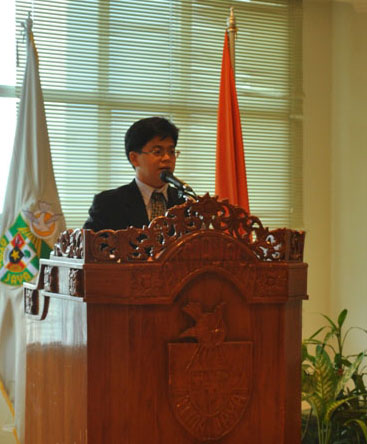
ASK
ME

REGISTER
NOW

For most laymen and pundits alike, the Education and Culture Ministry‘s policy to scrap both English and science from the national curriculum is quite mind-boggling. Under the initial pretext of a curricular load burdening students’ cognitive capacity, the ministry, albeit without clear logic, deleted these two subjects while maintaining Indonesian language, Pancasila state ideology, religion, math and civic education as compulsory subjects to be taught to students throughout their school years.
Despite the public’s outcry lambasting the obliteration of English and science, the education ministry has turned a deaf ear to this disapproval and has instead deliberated a new curriculum with the title, Kurikulum Perekat Kesatuan Bangsa (National Unity Curriculum), in a move to replace the currently implemented Kurikulum Tingkat Satuan Pendidikan (School-based Curriculum).
The shift to this new curriculum, as its name suggests, has been motivated primarily by our social milieu, which is often marred with such social ailments as street brawls, corruption, racial and religious clashes and moral denigration among youngsters.
The purpose of shifting the current curriculum to the new one is oriented toward social reconstruction. This orientation assumes that the behavior of those in society can be shaped, controlled and dictated through formal schooling. This helps explain why such core subjects as Pancasila, religion, and civic education remain intact in the curriculum.
These subjects have long been believed to be able to instill a positive character among students. Curriculum reform is indeed necessary, if not crucial, in order to serve as a binding force to help resolve problems in society.
While no one would deny the fact that any curriculum needs to be flexible in line with the dynamics of societal life, the exclusive reliance on one particular orientation at the expense of another will bring out what Eisner and Vallance (in their classic book Conflicting Conceptions of Curriculum, published in 1974) call “curriculum fallacies”.
Certainly, social reconstruction is a useful orientation to consider in any attempt to overhaul a curriculum, as the contents of the curriculum ought to be beneficial to its stakeholders, including society at large. That is, they are expected to reconstruct society for a common good.
To illustrate, through the exposure to religion, for example, students might be expected to refrain from cheating in exams and brawling, as these acts are considered not only forbidden and against religious norms, but sinful as well.
Yet, social reconstruction is purely a necessary, but not a sufficient condition of curriculum reform. A pedagogical orientation also needs to be spelled out, so that suitable methods of teaching, teaching-learning interactions, assessments and teaching materials can be projected beforehand.
For instance, how can civic education be effectively taught to students? How can we ensure that its teaching will yield a positive impact on the lives of students?
What kind of teaching materials will be used so teachers can optimally inculcate a positive character into their students? And finally, how will the cultivation of positive values through civic education be assessed?
Needless to say, under the new curriculum these reflective queries should be addressed from a completely different vantage point; simply replicating (I dare say it will happen) what has been addressed in the previous curriculum will only add more smoke and mirrors.
In addition, an orientation to educational politics needs to be considered. At the outset, we have to acknowledge that educational activities are always political and full of vested interests. They are not neutral and value-free. Likewise, decisions made to maintain certain school subjects and scrap others as part of curriculum reform are politically-loaded.
Looked at in this way, an orientation to educational politics is important because it could provide room for related stakeholders to question and challenge the maintained subjects in the new curriculum by virtue of their historical, political and social conditions.
As there seems to be a growing tendency among our educational practitioners to regard every new curriculum as an axiom and truism, consider that an orientation toward educational politics can avoid “curriculum fallacies”, resulting, according to Eisner and Vallance, from the ambition to one-sidedly judge a curriculum as right and universally applicable to all historical, political and social circumstances to which it relates.
by Setiono Sugiharto
The writer is an associate professor at the Atma Jaya Catholic University, Jakarta.
Sumber: The Jakarta Post/ November 24 2012